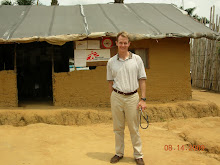
This morning I woke up at my usual early hour, went for a run on Axe Kindu, and returned home for breakfast. There were new arrivals last night so for a nice change I had camembert with my usual horrible coffee.
At 11 a.m., a car brought me to Tingi Tingi, a widened section of pavement called an "airstrip", located 20 minutes outside Lubutu. Seconds after we arrived, a small plane landed. Out popped three expatriates and their baggage. In response, Kirstin (a Belgian expatriate leaving Lubutu) and I jumped in. The twelve seat plane took off over the thick jungle. Slightly over an hour later we landed in Goma, far eastern Congo.
After a few minutes at the MSF base, I was drivn to the border and crossed into Rwanda. What a change! The roads are well paved and have shoulders or sidewalks where people can walk. When I jump on a taxi motorcycle the driver hands me a helmet. There are stoplights and there is currency other than the US dollar.
Thankfully one of the drivers from the MSF base helped me cross the border, travel by taxi motorcycle to the nearest Rwandan bus station, change money, buy a bus ticket, and get seated on the next bus to Kigali. From the border this entire procedure took twenty minutes, unheard of in Congo.
Three and a half hours later the bus arrived. I took another "taxi moto" to the recommended but not very nice Hotel Okapi.
So many things are strange here. There is a lot of traffic. In contrast with the quiet of Lubutu, Kigali is deafening. No one stares at me or says "bonjour" even though I saw few other white people in town. There are sidewalks, lots of traffic signals and glass buildings taller than one story. There is almost everything except ice cream parlors and movie theatres. Of course these were the two things I most eagerly anticipated! Too bad.

The countryside is drastically different here. There are mostly big rolling hills, almost completely deforested of their native trees, every inch divided into square cultivated plots. No matter how steep, nearly all of Rwanda is being used to grow food.
It is overwhelming to be in this city after four months in Lubutu.
Kigali is a one day city. I have been here exactly twenty-four hours and feel I have done and seen it all. There isn't a lot her for the tourist, but what I did see was powerful and nearly had me crying in public.
Mention Rwanda to most people and they remember the genocide of 1994. For one hundred days the majority Hutus slaughtered the minority Tutsis. After it was over, one million people had been murdered. When recounting this story, Rwandans pause here and then invariably add "Rwanda was dead."
Perhaps not dead but badly hurt. To begin healing the national wound, dozens of genocide memorials have been opened around the country. Today I visited one of them, the Kigali Memorial Center.
The Center has two floors. On the first, rooms are arranged in two circles, one inside the other. The exhibits in the outer circle begin with photographs and commentary of the colonization of Rwanda, steadily leading up to the events of 1994. Video screens tell the tales of eyewitnesses and survivors. It was chilling as I remember those 3 1/2 months very well. I remember thinking "uh oh, this is not going to be good" when the president of Rwanda's plane was shot down on approach to Kigali airport. I remember the killing extensively covered in the press while no government intervened to stop the massacre. And I remember being relieved when it was over.
After finishing the outer circle of commentary, the inner circle of exhibits were even more chilling. One room was filled with carefully stacked skulls, many crushed by blows. Another held thousands of photographs of victims, submitted by their families for display.
That over, I ascended the stairs. To the left were huge photos of children. A plaque below listed their favorite toys and foods and the way in which they were murdered. The remainder of the second floor detailed other genocides throughout history-Armenian Turks, European Jews, and Cambodians, among others.
I exited the building and walked around the gardens encircling the Memorial Center. The flowers and fountains sit atop the mass grave of 250,000 Rwandans.
After an emotionally wrenching three hours, I spent the remainder of my day shopping and walking the streets of Kigali. I have ended my afternoon and now sit with a drink next to the swimming pool at the Hotel de Mille Collines, made famous in the film "Hotel Rwanda." Only fifteen years ago, hundreds of people sought refuge here, drinking the water from the pool to stay alive.
As with all genocides, the most puzzling question is "How could people do this to each other?" Not to strangers but to neighbors and friends. My one full day in Kigali was interesting and emotionally exhausting.

Rwanda does sound rather beautiful. Coincidentally it was announced just the other day that Rwanda has just joined the British Commonwealth. There seems to be a battle for influence in Sub-Saharan Africa between Britain and France which has resulted in the accession of both Mozambique and Namibia and now, of course, Rwanda. But it is China that is the true colonist in these parts according to press reports.
ReplyDeleteHave you read "A Sunday by the Pool in Kigali"? Like "Hotel Rwanda" it brings home the horror of the genocide.
Carry on with the good work and with best wishes for Christmas and the New Year.
Margaret and David